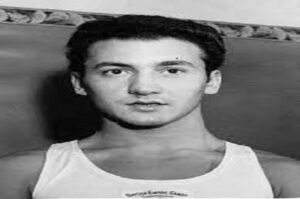Ringside Report Looks Back at Amateur Boxer Nicky Gargano (1934-2016)
 By Donald “Braveheart” Stewart
By Donald “Braveheart” Stewart
I have a friend who went into the military so he could run. Not run away, just keep running. He did serve and his record is an exemplary one, but he also ran for his unit, ran for the platoon or brigade or whatever it was called and ran for the army. He was always pretty fit. When he came out of the Marines, he then went on to become a personal security close protection guide and made some cash from handsomely cash rich people.
It introduced me to the idea, and I had heard of it before but had never really realized that it existed in this particular format, that those in the services could take their physical attributes and continue to use them in individual sporting disciplines. I remembered Kris Akabusi, a runner who had still been in the army when he had gone to the Olympics. I remembered thinking it was odd to have a “second job.”
From the realization that you could do both came the further realization that there must be others who were doing the same. Of course, there were. It was a thing. Now we have Kariss Artingstall, another Olympian, like Akabusi who has served in the military with a sporting career, and like Nicky Gargano making that career in boxing.
Born in the East End of London, in West Ham, on the 1st of November 1934, Gargano was a fearsome amateur who won bronze for Great Britain in the 1956 Melbourne Olympic Games and gold, two years previously in the Commonwealth Games in 1954 in Vancouver. Competing at welterweight, he won the 1954, 1955 and the 1956 Amateur Boxing Association (ABA) titles whilst competing for the army. Gargano is the only English boxer to win three national titles in a row at that weight. He boxed 197 times as an amateur – winning 190 and avenging 5 of his 7 losses! In 1955 he became the European Champion in Berlin and was crowned most stylish boxer there. He dazzled the crowds with what was described as “cultured” boxing. His representation for his country went beyond the big events and the two Games, as he was mentioned very warmly in a GB/USA international event in London when he beat Walter Sabbath of Detroit.
His Olympic triumph saw him face the new reality of international politics as he faced the Soviet Union’s Eduard Borysov, he then took on Argentina’s Francisco Gelabert and similarly swept past on points. He came undone when he faced the newly communist country of Romania and Nicolae Linca. Linca was to go on and win the gold medal so there was little by way of disgrace in losing to a gold medalist. Linca was also to go on and become a coach in the sport, earning the Sports Merit Order of First Class. Unfortunately, it was not a career that was to keep him in any style, and he eventually succumbed to the twin evils of Parkinson’s and Alzheimer’s in later life, whilst living in abject poverty.
But Gargano had gone to the Olympics as Britain’s most likely to win a gold. There were great expectations placed upon his shoulders and the loss to Linca was keenly felt. Boxing out of the Eton Manor Club, Gargano was following in the footsteps of its esteemed predecessor, Harry Mallin who had brough back gold form the 1924 Paris Olympics. Things had gone well until a phenomena we know only too well now, inadequate judging saw him lose in the semi-final. How keenly felt was obvious 1 month after the Games when Gargano, in January 1957, retired at the age of 22.
For Gargano there was to be no turning professional though he did have many professional admirers. One, the BBC legendary commentator when asked about him said, ”Gargano? Such skill, such timing, such defense.” Never known as a concussive puncher, Gargano was slick which along with his power made him fan friendly in the same way that in Scotland we lionised another amateur legend – Dick McTaggart.
Once out the ring, Gargano became involved in running pubs on the South Coast of England. A devoted husband, when his wife had a stroke, he cut back his commitments in his pubs to look after her. She left his side in 2014, tragically on the day of their 60th wedding anniversary before cancer took him in 2016. But I am an inferior Scot in comparison to a boxer who also went to the same Olympics as Gargano. The simply incomparable Dick McTaggart was an admirer of Gargano’s and I leave you with the words, not of a Scottish hack, but of a true Scottish legend, Olympic Gold Medalist, Dick McTaggart. ”Nicky was a great guy and he and I were very similar in how we fought. Nicky was – like me – a southpaw and like me he frustrated opponents by being elusive while counter-punching them – his style was also much admired by the fans… like me too, Nicky never, ever, turned professional.”
Click Here to Order Boxing Interviews Of A Lifetime By “Bad” Brad Berkwitt
RSR:

